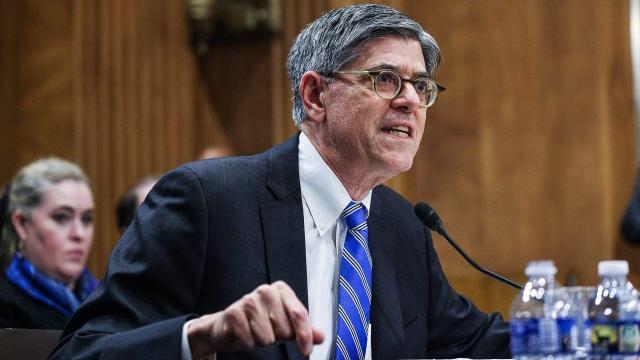The Senate Foreign Relations Committee advanced President Biden’s nominee for the position of ambassador to Israel, Jack Lew, on Wednesday, despite growing opposition from Republicans.
During a closed business meeting, committee members voted 12-9 to move forward with Lew’s nomination, sending it to a full floor vote. Senate Majority Leader Chuck Schumer, a Democrat from New York, had previously indicated that Democrats intended to expedite Lew’s confirmation, especially considering the ongoing conflict in Israel.
With the exception of Senator Rand Paul from Kentucky, all the Republicans on the committee opposed advancing Lew’s nomination, while every Democrat voted in favor.
Senator Paul expressed the importance of having an ambassador during a conflict and commended Lew’s qualities after a private meeting. He stated, “I think he’s a thoughtful individual and I think he will do a good job.”
Republican opposition to Lew had been mounting in the days leading up to his hearing, primarily due to his past involvement with Iran sanctions.
In 2018, an investigative subcommittee report from the Senate Homeland Security and Governmental Affairs Committee found that, during his tenure as Secretary of the Treasury in the Obama administration, Lew “granted a specific license that authorized a conversion of Iranian assets worth billions of U.S. dollars using the U.S. financial system.”
In response to these concerns, Lew emphasized during the hearing that he recognized Iran as a threat to regional stability and the existence of Israel. He pledged to uphold President Biden’s commitment to prevent Iran from acquiring a nuclear weapon.
The report highlighted attempts to convert $5.7 billion from U.S. banks into Iranian assets, with the Treasury’s Office of Foreign Assets Control encouraging two U.S. correspondent banks to facilitate the conversion.
In January 2016, then-President Barack Obama announced a $400 million cash transfer to Iran as part of a $1.7 billion settlement related to a long-standing dispute over an arms deal signed before the 1979 Iranian revolution.
Lew faced scrutiny over the transfer, which involved a combination of Swiss and other foreign currencies and was transported to Iran on unidentified cargo planes.
During the hearing, senators referenced these reports in their questions to Lew.
Ranking member Senator Jim Risch from Idaho stated during the closed business meeting on Wednesday, “During Obama’s administration, Mr. Lew was working directly under the table to get Iran back into the financial system,” explaining his decision to vote against Lew’s nomination. He emphasized the importance of selecting someone trusted by both Israel and the committee.
Senator Tom Cotton from Arkansas, who serves on the Senate Armed Services Committee, referred to Lew as an “Iran sympathizer.” He argued that the United States should reject Lew’s nomination to signal a new policy stance toward Iran.
The vote on Lew’s nomination on the Senate floor could take place as early as next week.
 Telegram is where we really talk. Don't miss out!
Telegram is where we really talk. Don't miss out!







